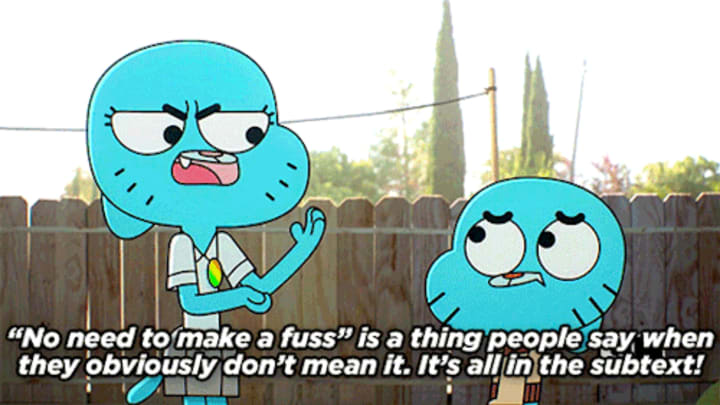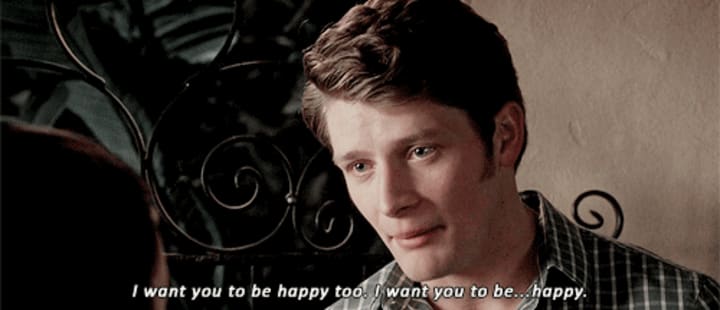How to Survive School with Bipolar Disorder
6 Things I Wish Someone Had Told Me Years Ago

Bipolar Disorder has an awful stigma attached to its name. Chances are, if you mention your experience with it to a stranger, they'll either respond with something like, "I think I might be bipolar because sometimes my attitudes change kinda fast," or they'll not-so-subtly scoot away, their hand reaching for their pepper spray should you do anything unpredictable.
Because of this, I didn't understand the disorder at all, and it wasn't until my senior year of high school that I was diagnosed with it. And, even then, I had no idea what it entailed. I just knew I was a shaky, sweaty, depressed trainwreck 99% of the time.
Now, as a full-time college student, I'm doing exceptionally well—I'm often referred to as "high functioning." I've grown to accept bipolar as a part of myself—not even necessarily as a disorder—and I'm making straight As in all of my classes. I graduated high school Cum Laude, president of the school choir program, and a successful stage actress with lots of new experience under my belt. And to think: only a year ago, I had thought I might have to go to alternative school. Or maybe even a psych ward.
Not everyone has had the experience I've had. That's partially due to the fact that BPD manifests differently in everyone, but I also suspect that many students simply don't get the help I was offered. So here I am to tell you that, regardless of your background or experiences,you can be successful with Bipolar Disorder. Here's some tips and tricks I've learned over the years to get you started.
Before anything—seek professional help.

I don't care what anyone tells you about how big a deal your struggle is or isn't—look for help. I advise, firstly, getting professionally diagnosed. This will help so much in the long run—it may even let you know if bipolar isn't what you're struggling with, which could change the course of your recovery entirely.
Additionally, if you're seeking medication, an official diagnosis is how you get that. I, personally, have felt so much better since I got on medication, but it isn't for everyone. I suggest you at least try it and go from there. The entire process is one of trial and error, in any case, so keep your mind open to the full range of your options. (This goes for therapy of all sorts, too.)
An official diagnosis can also qualify you for accommodations from the school—be that university or high school—and your job. Bipolar is considered a medical disability, so whether or not you agree with that idea (I personally don't), take advantage of what you've been offered. Get registered; push through the bureaucracy until you have what you need to be stable.
And remember: it's a legal matter. Everything is. This gives you some power over the process, but it also has its limitations. Check the specifics of your state's laws concerning the matter, if you're unsure of what your diagnosis warrants. Many institutions are concerned with the "liability" your disorder brings with it. Learn to work with that.
Now, I understand that there are plenty of people who can't, won't, or shouldn't go through with these processes. Your limitations can be anything from money trouble to a school with little to no tolerance or awareness of your condition. Trust me, I've been there before. My only advice on the subject, if this is your situation, is to expect a struggle with the school. Try your best to minimize conflict, but understand that, with a wild card of a condition like BPD, it's entirely likely that there will be incidents of sorts, many of which will be out of your control. So prepare for that, whatever that may mean for you.
However, official or not, the following advice is beneficial to anyone with BPD. Pay close attention.
1. Regulation, Regulation, Regulation

Regulation. Listen. I get it. That's one of those words that's, like, an inherent lie, because it's so easy to say, but it takes the worst kind of effort—long-term effort.
But let me tell you: regulation does NOT require a minute-to-minute schedule. It's a general, physical schedule you build up over time through sheer habit. For example, I wake up every morning at around 9 or 10 AM. I take my meds in the morning, write or do my homework in the afternoon, and eat at noon, five, and nine at night. Everything just kind of fits in between, and if there's a conflict—say I have a class at noon (which I don't), and I know I'll be hungry—I solve it preemptively. I eat enough food to hold me over until the class is over. Bada bing, bada boom. Problem solved.
And, as for the things on my to-do list—well. I make a to-do list. I have several different ones, just in case, and I check them regularly to be sure I'm not forgetting anything. I think, "Okay, I have to get this assignment done today because tomorrow's my birthday and I don't want to work" (true story), or "Alright, if this isn't done by 5 PM, I'm boned. Better get to it." And when I find I have extra time, I relax, or I get a head start on my list of tasks. I always ask myself—is this productive in any way? (And yes, I do consider binge-watching How To Get Away With Murder productive. Relaxing is important, too.) In this way, I make sure I'm never wasting time, because I know I'll regret it later.
Try out this method, or maybe ask an obnoxiously organized friend for advice (we all have one). Everyone's got their little quirks and ideas of optimal timing, and everyone's got their own needs. Compromise them with what you've got to do as best as you can.
2. Get your mania on a leash.

There are plenty of articles that make mania out to be this state of self-deception, where everything can seem awesome, but you're really breaking down like an overworked machine, and depression is waiting in the shadows for you to get off of your high so it can do its worst. And, you know, it can be that way. But you can move past it.
Though I take medication to subdue it, my mania's pretty prominent. It always comes out at the oddest of times, and for a long time, I would end up doing something embarrassing, or something I would regret later. But, after years of simply succumbing to the series of impulses mania can bring, I finally accepted the fact that I wasn't helping myself by letting BPD do what it wanted with me. I learned to tell myself, "no."
Now, I use mania to my advantage. If I feel it coming on, I know that then is a great time to work out. I'll get in some serious fitness points (and start cracking some stable endorphins), all the while subduing the racing thoughts by focusing on my form and breath. Or, if working out isn't an option (or I just don't want to do it), I start working on a creative project, or just plain homework—something I've been procrastinating, usually. I don't go to the store, go anywhere I may get lost, hit up people I've left out of my life for a reason, or stay in my room and sit in the feeling. It's a battle with yourself and your will; not your condition. Remember that.
3. Stay calm, for the love of god.

A symptom of BPD that no one ever talks about is an irritable disposition. Oftentimes, it's a conditional thing—I get incredibly moody when I haven't eaten, for example.
Firstly, listen to your body. If you know you get pissy when you're in a crowded room, or when someone won't stop talking, solve the problem preemptively. I make myself eat at least two meals a day, despite my reluctance to, because I don't want to turn into a walking Snickers ad.
Next, I recommend studying anger management techniques. Regular meditation is a good way to get in touch with your inner peace in any situation. This helped me through many, many incredibly tense dinners at home, where I couldn't simply leave. Exercise makes you feel pretty good for the rest of the day, if you're into that. Another remedy is having a fidget toy—which can also be good for manic episodes. My irritation eases when I can channel it elsewhere.
Or, if you're not into any of that, just try breathing slowly, with your diaphragm. I use the 4-4-4-4 technique: inhale for four counts, hold it for four counts, exhale for four counts, hold it for four counts. A little breath goes a long way.
For you ATLA geeks, remember Book 1 Zuko. He was a crabby jerk. He had no girlfriend, no Avatar, and mostly no hair.
Nobody wants to be a Zuko.
4. Depression will hit. Be ready for it.

You're gonna feel depressed. You're gonna be depressed. Accept it. Roll with it. But do not let it walk all over you.
Thenumber one mistake I made in my first few weeks of college was letting myself listen to sad music in my dark, empty dorm room without having had any food for five hours prior. That was the first panic attack I've had in almost a year. Do not do this to yourself.
When you feel depression begin to sit its dark little behind into your life, you look it in the eyes and say, "Hey. I see you. I get you. Give me a moment to get myself together, and we'll talk about it."
You get food, water, a change of scenery—whatever it takes to make yourself feel slightly better—and then you push yourself through a mini-catharsis. I write in a diary when things get rough, or I call a friend. I get to the source of things if it's something in my control. If not, I distract myself as best as I can. (That does not include sleeping or calling exes or self-harming in any way. Well—sleeping's alright, if it's bedtime, anyway. But for the love of all things holy, don't take a depression "nap" thirty minutes before your next class. You know you'll be out for, like, a day. Don't do that.)
In any case, a great way to make these times easier is to take care of yourself, physically and mentally. Therapy, even when I'm doing just fine, has helped me so much in the long run. As has exercise, and watching my diet. It's not going to cure your depression (despite what every fitness junkie might tell you), but I promise you you'll feel better.
5. Plan around your mood cycles.

I get really off-kilter towards the end of the month—PMS and BPD are not a great combination. But I know this, so I remind myself to remain extra diligent around that time. And I don't plan meet-ups with my friends that involve crowds, walking a lot, or loud noises.
On the other side of that, in the middle of the month, I feel swell. A little too swell. I set aside plans in my head for those days. Knowing I'll feel good and my brain will be quick as lightning, I tell myself that I'll write something on a particular day.
To get familiar with your mood cycles (and yes, non-uterus-owners, you have 'em too), I suggest putting a little mark on your calendar or something of the like. There are apps for tracking your mood, too, though I never found the format appealing to me, personally. I just know that when the date of the month gets into its twenties, I'd better gird my loins.
Know when to gird your loins, kids.
6. And, finally, keep fighting.

We all have inner demons we have yet to wrestle. We all have struggles in different parts of our lives.
My advice is meant to help, but even if you follow it religiously, you're going to have downfalls. You're going to fail. Something will happen in your life, something negative, I'm sorry to say—but that is okay.
You're going to get frustrated. You're going to forget something. It happens, man; take it easy. You can only try your best. That's all you can do.
But really, ask yourself: What kind of person do you want to be?
I decided, after much hardship and seeing sides of myself I've never wanted to see, that I want to be kind. I want to use my intelligence and creativity to achieve all I've ever wanted, and I want to use my struggles to empower myself and lift up others. I want to be the kind of person that people are glad to know. I want to be the kind of person that changes people.
Tell me. What is it you want to do?
Now make it happen.
You've got a long journey ahead of you. Best get moving, friend.

About the Creator
Juli Pope
A young writer, practicing with short stories. If you like what you read, please leave a tip, or- better yet- share the story!







Comments
There are no comments for this story
Be the first to respond and start the conversation.